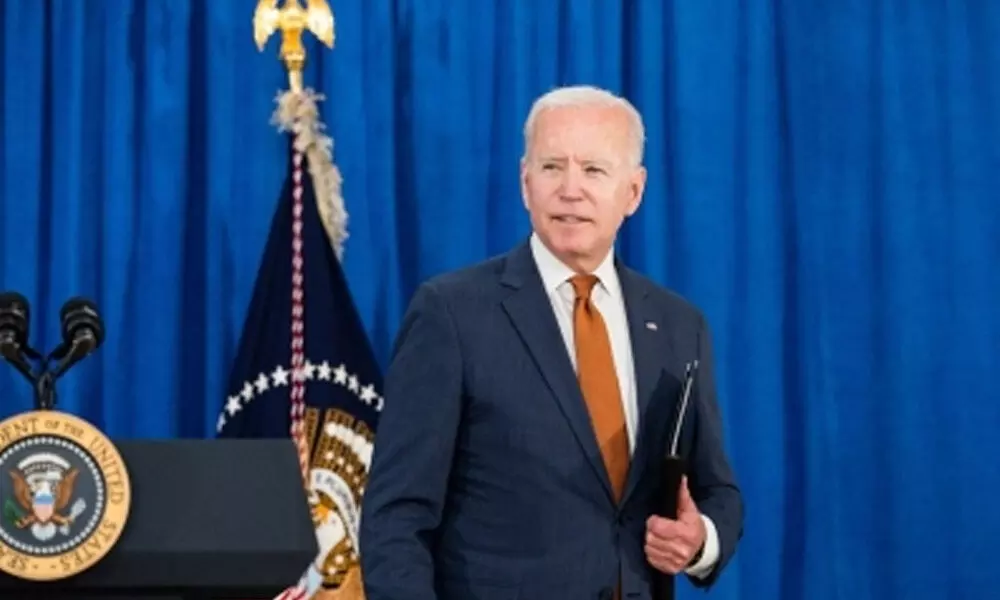Live
- Mandal Level CM Cup Sports Concludes in Ija with Promising Talent and Enthusiastic Participation
- Harish Rao Slams Revanth Reddy: "More Talk, Less Action"
- Revolutionising Oil and Gas: Gaurav Kumar Sinha’s AI-Driven Innovations Transforming Efficiency and Profitability
- Vishal Jain to head AiDASH facility
- Congress Central Election Committee has finalised the names of around 20 candidates for the upcoming Delhi Assembly elections
- District Collector Adarsh Surabhi has ordered to expedite the land acquisition process related to irrigation projects in the district
- Economics and Public policy gets new platform in Bengaluru
- Residents Demand Action After Accidents Highlight Poor Road Safety Measures
- Rahul Gandhi Visits Hathras Victim's Family, Slams BJP For Injustice
- Nitin Gadkari Admits India's Road Safety Crisis, Urges Change In Human Behavior And Infrastructure
Just In
Joe Biden pledges to 'get inflation under control'


US President Joe Biden
US President Joe Biden has pledged to "get inflation under control" as American voters were increasingly "pessimistic" about the economy and "doubted his ability" to fix supply chain issues and tackle soaring prices.
Washington: US President Joe Biden has pledged to "get inflation under control" as American voters were increasingly "pessimistic" about the economy and "doubted his ability" to fix supply chain issues and tackle soaring prices.
The President on Wednesday has backed the central bank's plan to scale back monetary stimulus and fight inflation, Xinhua news agency reported.
"Covid-19 has created a lot of economic complications, including rapid price increases across the world economy," Biden has said at a press conference in the White House to mark his first year in office.
"A critical job in making sure that the elevated prices don't become entrenched rests with the Federal Reserve, which has a dual mandate, full employment and stable prices," Biden said.
"Given the strength of our economy and the pace of recent price increases, it's appropriate as ... Fed Chairman (Jerome) Powell has indicated to recalibrate the support that is now necessary," said the president, noting he respects the independence of the central bank.
The Fed is on track to conclude its asset purchase program in mid-March as it exits from the ultra-loose monetary policy enacted at the start of the pandemic.
Fed officials' median interest rate projections released in mid-December showed that the central bank could raise interest rates three times this year, up from just one rate hike projected in September.
Biden also laid out a three-part plan to boost the US economy and help get inflation under control, including fixing the supply chain, passing his social spending plan known as Build Back Better, as well as promoting competition.
"The best thing to tackle high prices is a more productive economy with greater capacity to deliver goods and services to the American people," he said.
Biden's remarks came as more than half of American voters "disapproved" Biden's handling of economic issues in the first year of his administration, according to a CNBC and Change Research poll conducted in December.
The poll showed that the economy was the top priority for nearly all parties and demographics, and 73 per cent of voters believed that the US economy was in "poor" or "not so good shape," up 17 points from a year ago.
About 72 per cent of voters disapproved of Biden's handling of kitchen table issues like the price of everyday goods, and more than one-third of voters blame rising prices on him, according to the poll.
As a result, American voters were increasingly pessimistic about the economy improving in the next year.
US consumer sentiment index fell to 68.8 in the first half of January, the second lowest level in a decade, as Americans worried about surging inflation, the University of Michigan reported last week.
"While the Delta and Omicron variants certainly contributed to this downward shift, the decline was also due to an escalating inflation rate," Richard Curtin, chief economist of the survey, said in a statement.
"Three-quarters of consumers in early January ranked inflation, compared with unemployment, as the more serious problem facing the nation," Curtin said, noting American confidence in government economic policies is at its lowest level since 2014.
"It will be a difficult task to gauge the appropriate mix of fiscal and monetary policies when such fine-tuning is necessary in an era of large economic and non-economic disruptions. The most crucial and difficult task will be defusing the developing wage-price spiral," he said.
The consumer price index rose 7 per cent in December from a year earlier, the largest 12-month increase since June 1982, the US Labor Department reported last week.
"The key question is whether or not income will keep pace with inflation, only a little more than a third of consumers think it will," said Tim Quinlan and Sara Cotsakis, economic analysts at Wells Fargo Securities.
"The mean percentage of consumers expecting their family income will beat inflation in the next five years stayed at 36.1 per cent, where it has been for the past three months," they said, adding consumer confidence will likely be shaken in the next couple of months.

© 2024 Hyderabad Media House Limited/The Hans India. All rights reserved. Powered by hocalwire.com






